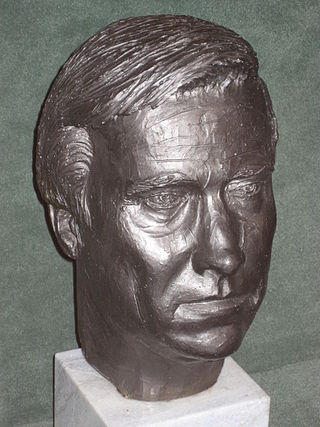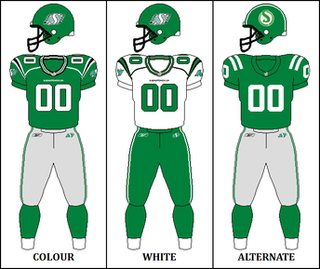Related Research Articles

The Saskatchewan Roughriders are a professional Canadian football team based in Regina, Saskatchewan. The Roughriders compete in the Canadian Football League (CFL) as a member club of the league's West Division.

Ronald Lancaster was an American-Canadian professional football player and coach in the Canadian Football League (CFL). As the starting quarterback for the Saskatchewan Roughriders for 16 seasons, he led the team to its first Grey Cup championship in 1966 and is the franchise's all-time leader in passing yards, attempts, completions, touchdowns, and interceptions. At the time of his retirement, he was the CFL's career leader in passing yards and still ranks sixth overall as of 2016. After his retirement as a player, he served as a head coach and general manager in the CFL; he led his teams to two Grey Cups and currently ranks fourth all-time with 142 regular season wins. He was also a colour commentator on the CFL on CBC from 1981 to 1990. At the time of his death, he was the Senior Director of Football Operations of the Hamilton Tiger-Cats. He is a member of the Canadian Football Hall of Fame (1982), Canada's Sports Hall of Fame (1985) and the Wittenberg University Athletic Hall of Honour (1985).
The 1977 CFL season is considered to be the 24th season in modern-day Canadian football, although it is officially the 20th Canadian Football League season.
The 1976 CFL season is considered to be the 23rd season in modern-day Canadian football, although it is officially the 19th Canadian Football League season.
The 1975 CFL season is considered to be the 22nd season in modern-day Canadian football, although it is officially the 18th Canadian Football League season.
The 1974 CFL season is considered to be the 21st season in modern-day Canadian football, although it is officially the 17th Canadian Football League season.
The 1973 CFL season is considered to be the 20th season in modern-day Canadian football, although it is officially the 16th Canadian Football League season.
The 1972 CFL season is considered to be the 19th season in modern-day Canadian football, although it is officially the 15th Canadian Football League season.
The 1971 CFL season is considered to be the 18th season in modern-day Canadian football, although it was officially the 14th Canadian Football League season.
The 1970 CFL season is considered to be the 17th season in modern-day Canadian football, although it is officially the 13th Canadian Football League season.
The 1969 CFL season is considered to be the 16th season in modern-day Canadian football, although it was officially the 12th Canadian Football League season.
The 1968 CFL season is considered to be the 15th season in modern-day Canadian football, although it is officially the 11th Canadian Football League season.
The 1967 CFL season was the tenth Canadian Football League season, and the 14th season in modern-day Canadian football.
The 1966 CFL season was the Canadian Football League's ninth season since the 1958 merger of the Interprovincial Rugby Football Union and the Western Interprovincial Football Union to create a national league. It was the 13th season in modern-day Canadian football.
The 54th Grey Cup was hosted at Empire Stadium in Vancouver, British Columbia on November 26, 1966. The Saskatchewan Roughriders won their first Grey Cup after 53 years of competition for this trophy, after losing eight times. With Eagle Keys as head coach the Roughriders defeated the Ottawa Rough Riders led by Frank Clair by a score of 29–14. George Reed was the MVP with 31 rushes for 133 yards and one rushing touchdown. Ottawa lost despite two TD passes of over 60 yards to the speedy long-ball threat Whit Tucker. The gooseneck or slingshot field goal posts, invented by Jim Trimble and Joel Rottman, were installed for this game, marking its first appearance in a football championship game. They made their debut a week earlier at Montreal's new Autostade for the Eastern Conference finals. The game was called with four seconds left in regulation when fans swarmed the field in celebration.
The 64th Grey Cup was played on November 28, 1976, at Exhibition Stadium in Toronto. The Ottawa Rough Riders defeated the Saskatchewan Roughriders 23–20 in what is considered one of the most thrilling Grey Cup games, featuring some of the most exciting plays in Grey Cup history.
The 60th Grey Cup was played on December 3, 1972, before 33,993 fans at the Ivor Wynne Stadium at Hamilton. It was the last Grey Cup to be played in December until 2021, which, coincidentally, was also held in Hamilton. The Hamilton Tiger-Cats defeated the Saskatchewan Roughriders 13–10.
57th Grey Cup, the Canadian Football League's championship game, was played November 30, 1969, and the Ottawa Rough Riders defeated the Saskatchewan Roughriders 29–11 before 33,172 fans at Montreal's Autostade. It was the first time since 1931, a break of 38 years, that the CFL title match would be played in Montreal.
Jack Abendschan is a former Canadian Football League offensive lineman and placekicker who played for the Saskatchewan Roughriders from 1965 through 1975.

The 2008 Saskatchewan Roughriders finished in 2nd place in the West Division with a 12–6 record for the second consecutive year. It was their 51st season in the Canadian Football League. The Roughriders attempted to repeat as Grey Cup champions, but, due to an abundance of injuries, lost to the BC Lions in the West Semi-Final game.
References
- ↑ "Saskatchewan Roughriders historical Canadian Football League (CFL) scores, schedules, and analytics".
- ↑ "CFL.ca - Official Site of the Canadian Football League". Archived from the original on 2009-11-26.
- ↑ Mullick, Rajeev. CFL Legends: Ron Lancaster. Retrieved January 17, 2006.